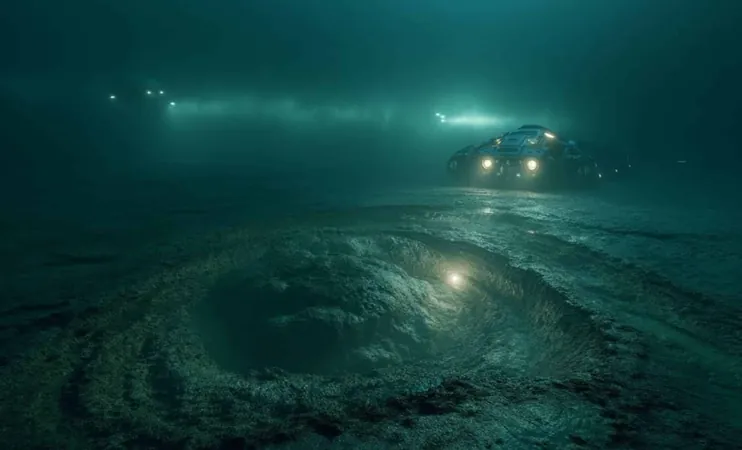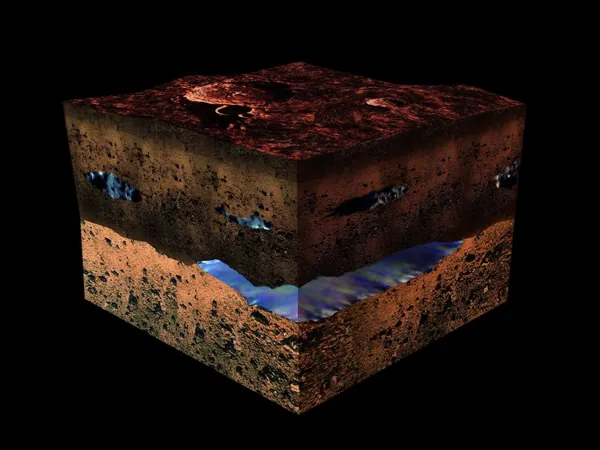
A Robot's Dive into Lake Baikal Unveils Astonishing Geological Secrets That Could Rewrite Earthquake Predictions!
2025-04-10
Author: Benjamin
In the frigid, enigmatic depths of Lake Baikal—the oldest and deepest freshwater lake on the planet—an innovative robotic expedition is turning the scientific community upside down with jaw-dropping discoveries. Stretching down to an astonishing 1,642 meters, this unique body of water has always captivated researchers, but now it holds a tantalizing mystery beneath its surface.
Mud Volcanoes Erupting: A Stunning Discovery!
In the summer of 2023, a team of daring scientists deployed an autonomous underwater vehicle (AUV) into these chilling waters, targeting the northwestern basin of Lake Baikal. What they found was nothing short of extraordinary—dynamic mud volcanoes erupting between 100 and 165 meters deep in both Malaya Kosa Bay and Goryachinskaya Bay.
While the existence of mud volcanoes in Lake Baikal was known, the ongoing eruptions at surprisingly shallow depths and near the tectonically-active Severobaikalsk fault took scientists completely by surprise. Oksana Lunina, the expedition's structural geologist, commented, "The fault is alive!" This revelation could usher in a new era for understanding seismic activity in the region.
The Unexpected Link Between Eruptions and Earthquakes
The newfound eruptions are unprecedented, suggesting a direct correlation between the mud volcanoes and the Severobaikalsk fault. This newly discovered link could revolutionize how scientists predict earthquakes. Researchers identified large-scale deformation zones and brittle fractures on the lake floor, helping them trace seismic activity back to these mud eruptions.
In Goryachinskaya Bay, the robot unearthed steep slopes adorned with porous clay ridges and miniature mud cones, some only five centimeters tall. Many of these features appeared freshly disturbed, hinting at ongoing volcanic activity. Gas-filled fluids were observed bubbling to the surface, reinforcing the connection between these geological features and tectonic movements.
Extreme Life Thriving Amidst Turmoil!
But the surprises didn't end with geological revelations—this robotic dive also unveiled life flourishing in some of the harshest environments on Earth. Around the mud volcanoes, researchers discovered an astonishing variety of extremophiles—organisms that thrive in extreme conditions.
Among the bizarre inhabitants were amphipods, gastropods, planarians, and cottoid fish, all found in the central vents of the mud volcanoes where icy temperatures and high pressure reign. Colonies of white sponges were spotted clinging to rocky outcrops, showcasing nature's remarkable resilience.
The resilience of these organisms offers profound insights into life's adaptability, hinting at how life could exist elsewhere in the universe. As scientists unravel the mysteries of Lake Baikal, they not only expand our understanding of extreme ecosystems but may also uncover clues about potential extraterrestrial life!
A New Frontier in Earthquake Prediction and Astrobiology!
With these groundbreaking discoveries, Lake Baikal is not just a site for geological curiosity; it is rapidly becoming a pivotal player in earthquake prediction and the search for extraterrestrial life. As further research unfolds, scientists are set to redefine our relationship with this ancient lake—and maybe even the cosmos!









 Brasil (PT)
Brasil (PT)
 Canada (EN)
Canada (EN)
 Chile (ES)
Chile (ES)
 Česko (CS)
Česko (CS)
 대한민국 (KO)
대한민국 (KO)
 España (ES)
España (ES)
 France (FR)
France (FR)
 Hong Kong (EN)
Hong Kong (EN)
 Italia (IT)
Italia (IT)
 日本 (JA)
日本 (JA)
 Magyarország (HU)
Magyarország (HU)
 Norge (NO)
Norge (NO)
 Polska (PL)
Polska (PL)
 Schweiz (DE)
Schweiz (DE)
 Singapore (EN)
Singapore (EN)
 Sverige (SV)
Sverige (SV)
 Suomi (FI)
Suomi (FI)
 Türkiye (TR)
Türkiye (TR)
 الإمارات العربية المتحدة (AR)
الإمارات العربية المتحدة (AR)